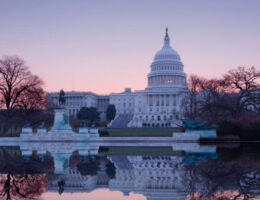The Commissioners of the Federal Trade Commission (FTC) have voted unanimously to issue a final rule developed by both the Antitrust Division of the US Department of Justice and the FTC, updating the Premerger Notification Rules that implement the Hart Scott Rodino Antitrust Improvement Act (“HSR Act”), including substantial changes to the HSR Form.
A federal judge in Texas recently issued a nationwide injunction against the Federal Trade Commission’s rule banning most employee noncompetes. The injunction relieves employers from having to comply with the rule, meaning that employers can maintain noncompete agreements they have in place with employees. The FTC issued a statement indicating that it is considering its appeal options to remove the injunction, and noted that it remains able and willing to challenge the legality of noncompetes on a case-by-case basis, which was never in dispute.
A federal judge in the Northern District of Texas has granted a preliminary injunction that partially enjoins the Federal Trade Commission’s (FTC) final rule on noncompete covenants. In sum, the judge found that “the Commission has exceeded its statutory authority in promulgating the noncompete rule” and noted that the “role of an administrative agency is to do as told by Congress, not to do what the agency thinks it should do”. Most notably, the court determined that the plaintiffs are likely to succeed on the merits of their challenge to the rule because the FTC lacks substantive rulemaking authority.
On 20 May, the US District Court for the Central District of California affirmed a seven-figure jury verdict and granted a permanent injunction in a rare Robinson-Patman Act decision. The RPA is an antitrust statute that prohibits certain kinds of price discrimination in goods purchased for resale. The case, LA International Corp. v. Prestige Brands Holdings, was pursued by a group of local wholesaler plaintiffs that claimed a defendant eye drop manufacturer and its subsidiaries sold the plaintiffs eye drops on less favorable terms than the defendant’s club store wholesale customer.
Federal regulatory agencies have prioritized enforcement efforts that target the mishandling of data by companies that store and monetize large amounts of personal or sensitive information. This issue cuts across multiple regulatory areas which has prompted increased coordination between federal agencies. Notably, on March 26, 2024, the US Federal Communications Commission, Consumer Financial Protection Bureau, and the Federal Trade Commission, publicized a coordinated effort to increase their technological capabilities to address privacy and competition concerns related to the use of data.
On 1 December 2023, the US Court of Appeals for the Fourth Circuit reversed a Sherman Act conviction of a former executive of an aluminum products manufacturer for failure to state a per se antitrust offense. In February 2022, the former executive was found guilty of six counts: conspiracy to rig bids, conspiracy to commit mail or wire fraud, three counts of mail fraud, and one count of wire fraud. The court affirmed the mail and wire fraud convictions, but reversed the Sherman Act conviction of conspiracy to rig bids. The Fourth Circuit held that the trial court erred in applying the per se rule without considering the fact that the alleged scheme took place within the context of a “dual distribution” relationship among competing bidders, who also maintained a supplier relationship.
The Federal Trade Commission has just announced its annual adjustment to the notification thresholds that determine whether proposed transactions may trigger a filing obligation under the Hart-Scott-Rodino (HSR) Antitrust Improvements Act of 1976, as amended. The corresponding adjustments to the HSR filing fee schedule also were included in the announcement. The adjusted notification thresholds and filing-fee schedule will apply to transactions that close on or after the effective date, which will be 30 days after publication in the Federal Register and no earlier than 26 February 2024.
On 18 December 2023, the Antitrust Division of the US Department of Justice (DOJ) and the Federal Trade Commission (FTC) jointly issued their highly anticipated final version of the 2023 Merger Guidelines . The issuance of the Guidelines follows the agencies’ release of draft guidelines in July and the conclusion of a public notice-and-comment period. The Guidelines set out how the agencies assess whether mergers and acquisitions threaten anticompetitive harm in violation of US antitrust laws.
Most notably, the newly issued Guidelines retained the lower thresholds for establishing presumptions of anticompetitive harm — including if the merger gives the combined firm more than 30% market share. Additionally, the Guidelines outline a holistic approach for analyzing vertical mergers.
On 1 December 2023, the US Court of Appeals for the Fourth Circuit reversed a Sherman Act conviction of a former executive of an aluminum products manufacturer for failure to state a per se antitrust offense. While DOJ is considering en banc review of this opinion, if upheld the decision could have lasting implications for how the DOJ proceeds with indictments involving parties that engage in dual distribution. We will continue to monitor for future developments in this case as it moves forward.
In a notable turn of events, the Federal Trade Commission announced that it would abandon its in-house post-consummation challenge of the 2018 acquisition by Axon Enterprise, Inc. of VieVu, LLC. The FTC’s decision follows a recent adverse ruling from the Supreme Court, which held that parties are entitled to assert constitutional challenges against the FTC before being required to participate in its administrative proceedings. Following the Supreme Court’s decision, the FTC is likely to confront more challenges when pursuing enforcement actions—including, in particular, merger challenges—through its in-house administrative proceedings.








